Unit 4 核心考点精讲精练-七年级英语下册同步课件(人教版)
文档属性
| 名称 | Unit 4 核心考点精讲精练-七年级英语下册同步课件(人教版) |
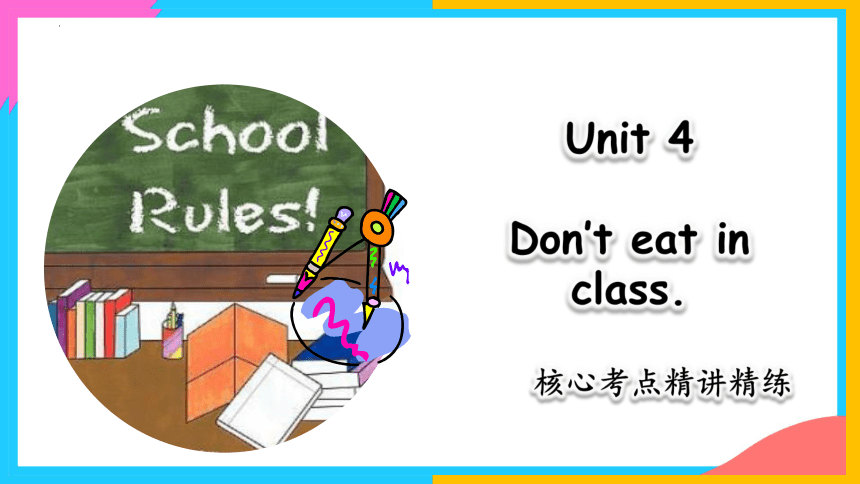
|
|
| 格式 | pptx | ||
| 文件大小 | 920.2KB | ||
| 资源类型 | 试卷 | ||
| 版本资源 | 人教新目标(Go for it)版 | ||
| 科目 | 英语 | ||
| 更新时间 | 2024-03-18 22:04:03 | ||
图片预览

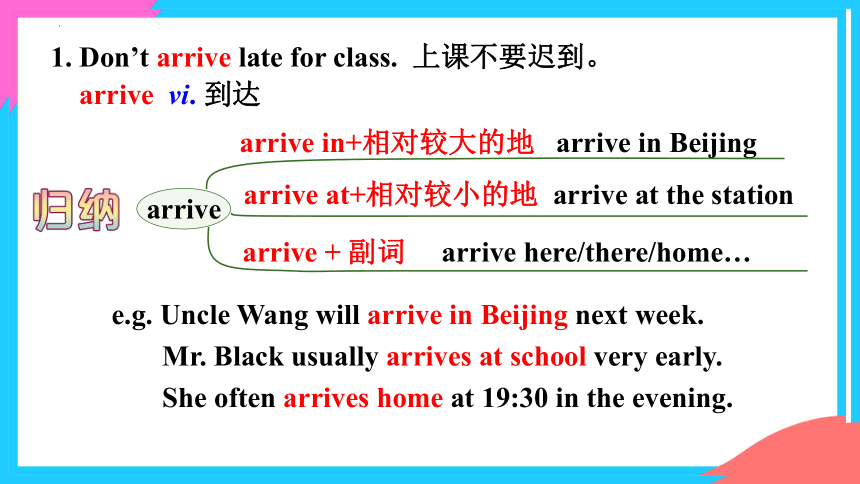

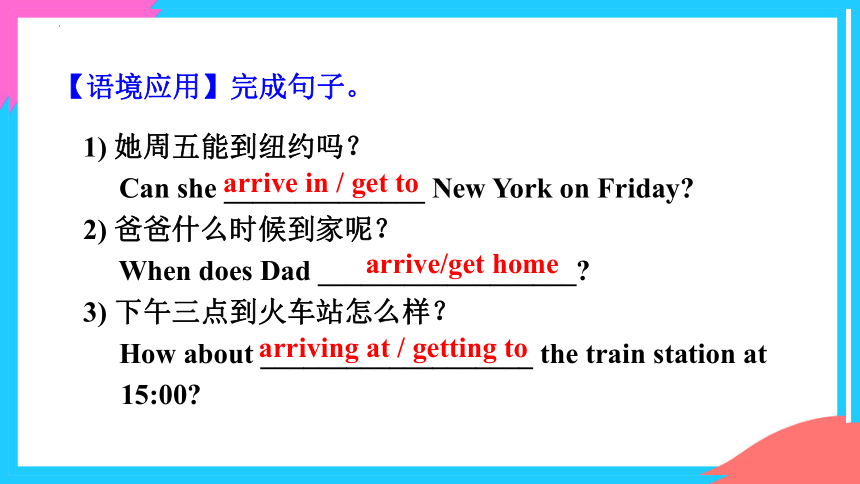
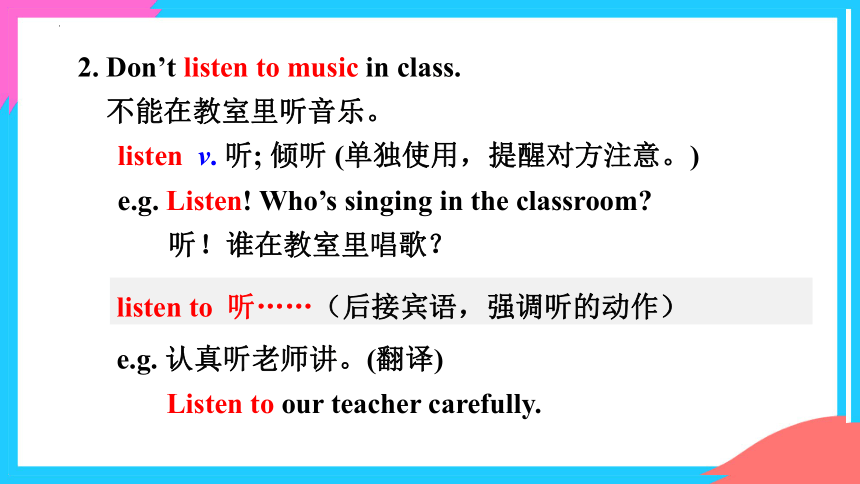
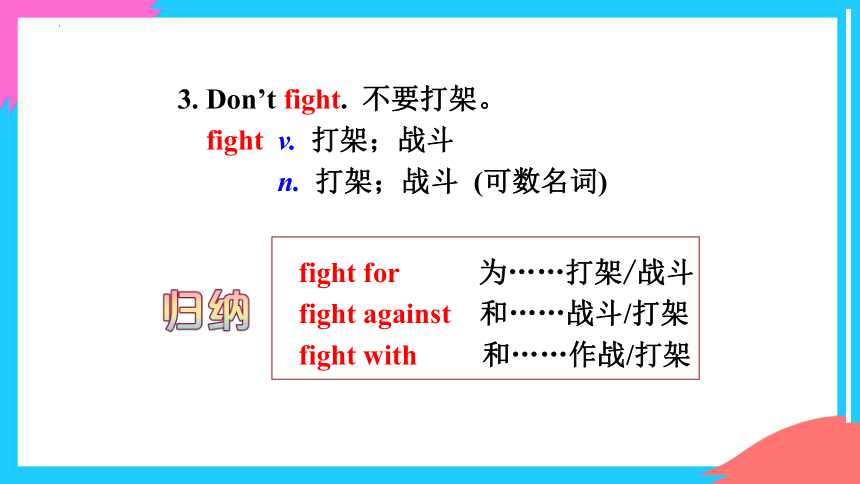
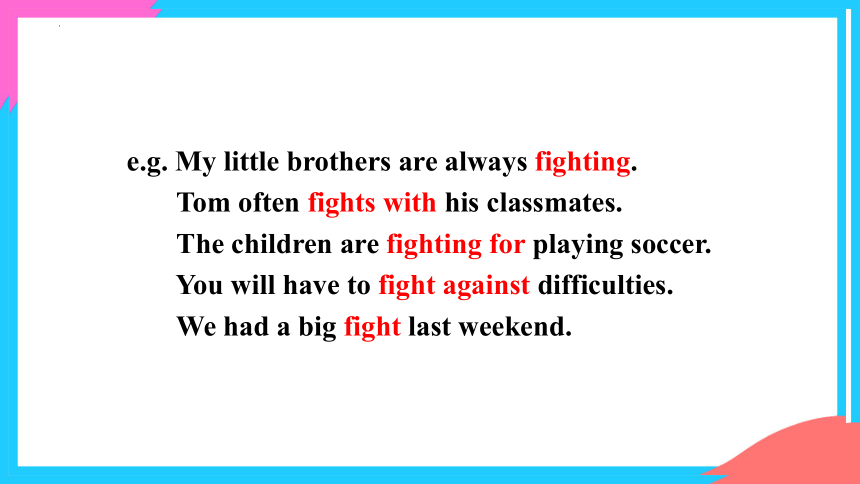

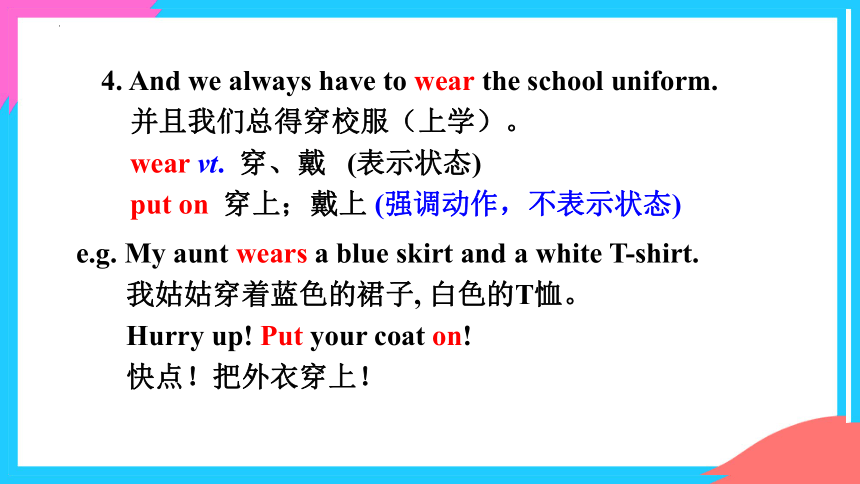
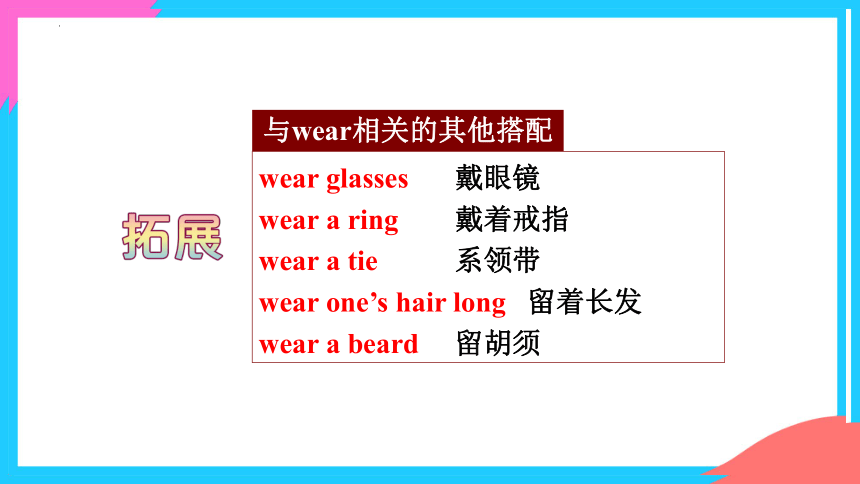
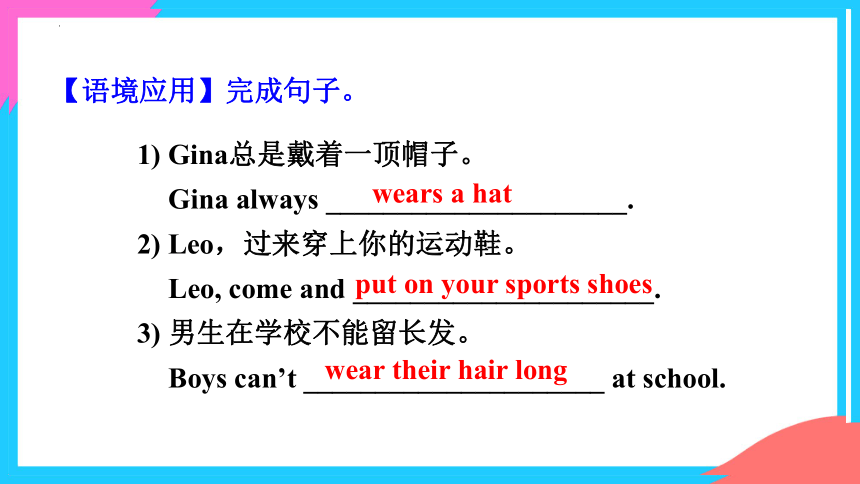
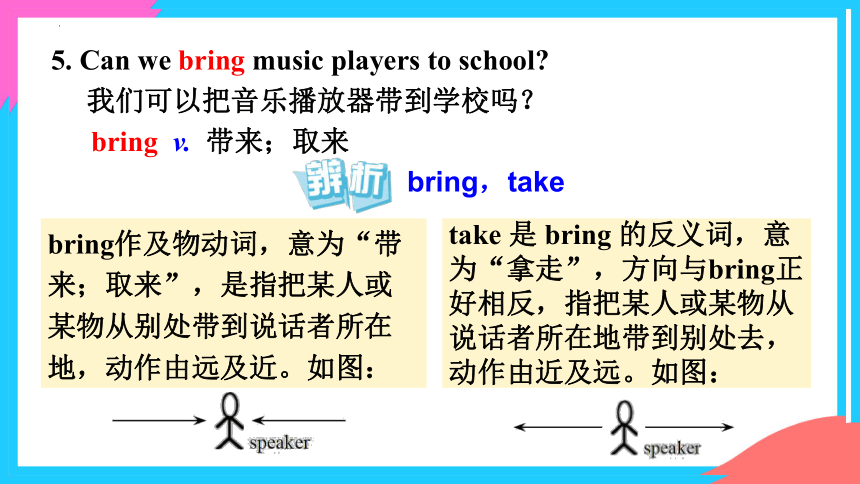
文档简介
(共36张PPT)
Unit 4
Don’t eat in class.
核心考点精讲精练
1. Don’t arrive late for class. 上课不要迟到。
arrive vi. 到达
e.g. Uncle Wang will arrive in Beijing next week.
Mr. Black usually arrives at school very early.
She often arrives home at 19:30 in the evening.
arrive in+相对较大的地 arrive in Beijing
arrive at+相对较小的地 arrive at the station
arrive + 副词 arrive here/there/home…
arrive
e.g. This flight usually arrives in / gets to Guangzhou at ten.
Tim arrives at / gets to school at 7: 30 every morning.
When do you usually arrive/get home
Helen can arrive / get here in an hour.
arrive at / in的同义表达为get to。
1) 她周五能到纽约吗?
Can she ______________ New York on Friday
2) 爸爸什么时候到家呢?
When does Dad __________________
3) 下午三点到火车站怎么样?
How about ___________________ the train station at 15:00
arriving at / getting to
arrive/get home
arrive in / get to
【语境应用】完成句子。
listen v. 听; 倾听 (单独使用,提醒对方注意。)
e.g. Listen! Who’s singing in the classroom
听!谁在教室里唱歌?
2. Don’t listen to music in class.
不能在教室里听音乐。
e.g. 认真听老师讲。(翻译)
Listen to our teacher carefully.
listen to 听……(后接宾语,强调听的动作)
3. Don’t fight. 不要打架。
fight v. 打架;战斗
n. 打架;战斗 (可数名词)
fight for 为……打架/战斗
fight against 和……战斗/打架fight with 和……作战/打架
e.g. My little brothers are always fighting.
Tom often fights with his classmates.
The children are fighting for playing soccer.
You will have to fight against difficulties.
We had a big fight last weekend.
1) 你昨天和你弟弟打架了?
Did you ________ ________ your brother yesterday
2) 两条狗在为一些肉打架。
Two dogs ________ ________ ________ some meat.
3) 让我们与污染(pollution)作战。
Let's ________ __________.
fight with
are fighting for
fight pollution
【语境应用】完成句子。
4. And we always have to wear the school uniform.
并且我们总得穿校服(上学)。
wear vt. 穿、戴 (表示状态)
put on 穿上;戴上 (强调动作,不表示状态)
e.g. My aunt wears a blue skirt and a white T-shirt.
我姑姑穿着蓝色的裙子, 白色的T恤。
Hurry up! Put your coat on!
快点!把外衣穿上!
wear glasses 戴眼镜
wear a ring 戴着戒指
wear a tie 系领带
wear one’s hair long 留着长发
wear a beard 留胡须
与wear相关的其他搭配
1) Gina总是戴着一顶帽子。
Gina always _____________________.
2) Leo,过来穿上你的运动鞋。
Leo, come and _____________________.
3) 男生在学校不能留长发。
Boys can’t _____________________ at school.
wear their hair long
wears a hat
put on your sports shoes
【语境应用】完成句子。
5. Can we bring music players to school
我们可以把音乐播放器带到学校吗?
bring v. 带来;取来
bring作及物动词,意为“带来;取来”,是指把某人或某物从别处带到说话者所在地,动作由远及近。如图:
take 是 bring 的反义词,意为“拿走”,方向与bring正好相反,指把某人或某物从说话者所在地带到别处去,动作由近及远。如图:
bring,take
bring
take
与bring和take相关的常见搭配:
bring / take sb. / sth. to ... 把某人/某物带到……
1) —Can you _______ this baseball to Julie She’s in her
classroom.
—Sure. I’ll go now.
2) Please _______ my ID card to school now. I need it.
【语境应用】选词填空(bring & take)。
e.g. Jenny brings a letter to me.
I want to take these apples to my grandparents.
6. can / must / have to
can表许可、可以; 否定形式can’t 表禁止,不行。
must表示说话人的主观看法,必须; 否定形式mustn’t,意为 “不准;禁止”。
have to表必须时与must意义接近,有时可互换;
have to更侧重于客观需要。可用在不同时态中,有人称和数的变化,一般现在时的否定形式为don’t / doesn’t have to意为“不必”。
1) 你今晚不可以看电视。
You ___________________ this evening.
2) 我们必须按时到达机场。
We __________________________ the airport on time.
3) 你早晨不必起那么早。
You ____________________ so early in the morning.
can’t watch TV
must/have to arrive at/get to
don’t have to get up
【语境应用】完成句子。
祈使句一般用于上级对下级,长辈对晚辈之间,表示请求、命令、劝说、号召、警告等。祈使句中, 通常省略第二人称主语you。
肯定式以动词原形开头,否定式一般在动词原形前加don’t。
e.g. Come and join us.
Read after me.
Don’t be late.
Don’t talk in class!
Don’t let the children swim in the river.
归 纳
1. 以行为动词原形开头,简称Do型。
e.g. Come here. 到这儿来。
2. 以动词be开头,简称Be型。
e.g. Be quiet, please. 请安静。
3. 以Let开头,简称Let型。
e.g. Let’s go! 咱们走吧!
一、祈使句的肯定式
有时可在祈使句的句首或句尾加上please,使语气显得客气、有礼貌。如果在句尾加please,应该用逗号与前句隔开。e.g. Go this way, please. 请这边走。
注意:
1. Do型和Be型的否定式是在句首加don’t。
e.g. Don’t sit here. 不要坐在这儿。
Don’t be late. 别迟到。
2. 以let开头的祈使句,其否定式有两种:
1) 直接在句首加don’t
2) let +宾语 + not + 动词原形 + (其他)
e.g. Don’t let him go. 不要让他走。
Let’s not go there. 咱们别去那儿。
二、祈使句的否定式
注意:
“No+名词/动词 ing形式”表示禁止或规劝,常用于公共场所。
e.g.
No photos! 禁止拍照!
No smoking! 禁止吸烟!
1) 快点走。
Walk quickly.
2) 别让他们说话。
Don’t let them talk. / Let them not talk.
3) 安静点!
Be quiet!
4) 不要在这儿吃东西。
Don’t eat here.
【语境应用】翻译句子。
can 表示请求、允许,意为“可以 ” 。
I can play badminton, but I can’t play volleyball.
can还可表示能力, 意为“能、会”。
— Can the students run in the hallways
— Yes, they can./No, they can’t.
We can’t eat in the classroom.
could 也可表示请求,但比can的语气更委婉。
Could you tell him to call me back
can
归 纳
肯定句:
主语+can+动词原形+其他.
否定句:
主语+can not/can’t+动词原形+其他.
疑问句:
Can+主语+动词原形+其他
肯定回答:Yes, 主语+can.
否定回答:No, 主语+can’t.
情态动词can的句型结构:
must 必须;一定
表示主观需要或责任感的驱使有必要或有义务去做某事,没有人称和时态的变化,后接动词原形。
句型结构:主语+must+动词原形+其他
e.g. Don’t arrive late for class. We must be on time.
You must read a book before you watch TV.
mustn’t 表示 “不准; 禁止”。
e.g. You mustn’t talk to your mother like that.
have to 必须;不得不
表示因客观的需要不得不做某事,有人称和时态的变化,后接动词原形。
其否定式don’t / doesn’t have to表示“不必;没必要”。
否定形式和疑问句形式均需要借助助动词do才可以进行变化。
practice the guitar 练习吉他
practice v. 练习(后可跟名词、代词或动词-ing形式)
e.g. I must practice English every morning.
我每天早晨必须练习英语。
We are practicing speaking English.
我们在练习说英语。
practice n. 练习
e.g. It takes a lot of practice to play the violin well.
拉好小提琴需要多加练习。
1. But I have to go be bed before 10:00.
但我十点前就得上床睡觉。
before prep. (时间上)在……之前; after 在……之后
e.g. Wash your hands before dinner. 饭前洗手。
Do your homework after school. 放学后做作业。
before conj. 在……之前,常引导时间状语从句
before adv. “从前;以前”,多与完成时连用,置于句末
e.g. I haven’t seen the film before.
我以前没看过这部电影。
1) 我们以前读过这本书。
2) 她总是黎明前就起床了。
【语境应用】翻译句子。
She always gets up before dawn.
We have read the book before.
2. There are a lot of things you can do.
有许多你可以做的事情。
a lot of things you can do是一个名词短语, you can do起修饰、限定名词things的作用。当句子限定修饰名词时要放在该名词之后。
e.g. There are a lot of songs you can sing.
有许多歌曲你可以唱。
3. Parents and schools are sometimes strict, but remember, they make rules to help us.
家长和校方有时(要求)严格,但是记住:他们规定规矩是为了帮助我们。
e.g. My grandmother is very strict.
My mother is strict with me.
Betty is always strict in her work.
strict adj. 严格的;严厉的
be strict with sb. 对某人严格/严厉
be strict in / about sth. 在某事上严格
1) 我们的数学老师非常严厉。
Our maths teacher _____________________.
2) 李婷的父母对她要求严格。
Li Ting’s parents ______________________.
3) Miller对她的学生很严厉,她对她的工作也很严格。Miss Miller is strict _______ her students and also strict ________ her work.
is very strict
are strict with her
with
in
【语境应用】完成句子。
remember v. 记住;记起
e.g. I can't remember his name.
Jack remembers reading this book before.
Jack记得以前读过这本书。
Remember to call your mother after school.
放学后记得给你妈妈打电话。
其后可接名词(短语)、代词、动词-ing形式或动词不定式。
remember doing sth. 记得做过某事
remember to do sth. 记得要做某事
1) 我记不住你的电话号码。
I can’t _______________________________________.
2) 记住明天把你们的作业带到这儿来。
____________________ your homework here tomorrow.
3) Lisa记得打扫过这个房间。
Lisa ______________________________.
remember your telephone / phone number
Remember to bring
remembers cleaning this room
【语境应用】完成句子。
4. I have to keep my hair short. 我得留短发。
keep vt. 保持;保留
keep作及物动词,用于“keep + sb. / sth. + adj. / adv. / 介词短语”结构中,意为“使某人 / 某物……”。
e.g. We must keep our classroom clean every day.
我们必须每天保持教室清洁。
keep作系动词,后接形容词,意为“保持某种状态”。
e.g. Don’t keep busy. You should have a rest sometimes.
不要一直忙。你有时应该休息一下
1) Students must _____________________(保持安静) in the library.
2) I often play with my sister to _____________________(让她开心).
3) Kate ___________________________(一直散步) every evening after dinner.
【语境应用】完成句子。
keep her happy
keep quiet
keep后跟动词时,要用-ing形式,keep doing sth.意为“一直做某事”。
keeps walking / taking a walk
5. I must learn to play the piano. 我必须学会弹钢琴。
learn v. 学习;学会
learn + n. / pron.
e.g. Grandma Li wants to learn English.
Swimming is a little difficult, but I want to learn it well.
learn to do sth. 学习/学会做某事
e.g. Let’s learn to play basketball after class.
让我们下课后学打篮球。
learn from ... 向……学习
e.g. I can learn a lot from my parents.
我可以从父母身上学到很多。
1) Rick总是向他的哥哥学习。
Rick always _____________________.
2) Amy想学弹钢琴。
Amy wants to _____________________.
learns from his brother
learn to play the piano
【语境应用】完成句子。
Unit 4
Don’t eat in class.
核心考点精讲精练
1. Don’t arrive late for class. 上课不要迟到。
arrive vi. 到达
e.g. Uncle Wang will arrive in Beijing next week.
Mr. Black usually arrives at school very early.
She often arrives home at 19:30 in the evening.
arrive in+相对较大的地 arrive in Beijing
arrive at+相对较小的地 arrive at the station
arrive + 副词 arrive here/there/home…
arrive
e.g. This flight usually arrives in / gets to Guangzhou at ten.
Tim arrives at / gets to school at 7: 30 every morning.
When do you usually arrive/get home
Helen can arrive / get here in an hour.
arrive at / in的同义表达为get to。
1) 她周五能到纽约吗?
Can she ______________ New York on Friday
2) 爸爸什么时候到家呢?
When does Dad __________________
3) 下午三点到火车站怎么样?
How about ___________________ the train station at 15:00
arriving at / getting to
arrive/get home
arrive in / get to
【语境应用】完成句子。
listen v. 听; 倾听 (单独使用,提醒对方注意。)
e.g. Listen! Who’s singing in the classroom
听!谁在教室里唱歌?
2. Don’t listen to music in class.
不能在教室里听音乐。
e.g. 认真听老师讲。(翻译)
Listen to our teacher carefully.
listen to 听……(后接宾语,强调听的动作)
3. Don’t fight. 不要打架。
fight v. 打架;战斗
n. 打架;战斗 (可数名词)
fight for 为……打架/战斗
fight against 和……战斗/打架fight with 和……作战/打架
e.g. My little brothers are always fighting.
Tom often fights with his classmates.
The children are fighting for playing soccer.
You will have to fight against difficulties.
We had a big fight last weekend.
1) 你昨天和你弟弟打架了?
Did you ________ ________ your brother yesterday
2) 两条狗在为一些肉打架。
Two dogs ________ ________ ________ some meat.
3) 让我们与污染(pollution)作战。
Let's ________ __________.
fight with
are fighting for
fight pollution
【语境应用】完成句子。
4. And we always have to wear the school uniform.
并且我们总得穿校服(上学)。
wear vt. 穿、戴 (表示状态)
put on 穿上;戴上 (强调动作,不表示状态)
e.g. My aunt wears a blue skirt and a white T-shirt.
我姑姑穿着蓝色的裙子, 白色的T恤。
Hurry up! Put your coat on!
快点!把外衣穿上!
wear glasses 戴眼镜
wear a ring 戴着戒指
wear a tie 系领带
wear one’s hair long 留着长发
wear a beard 留胡须
与wear相关的其他搭配
1) Gina总是戴着一顶帽子。
Gina always _____________________.
2) Leo,过来穿上你的运动鞋。
Leo, come and _____________________.
3) 男生在学校不能留长发。
Boys can’t _____________________ at school.
wear their hair long
wears a hat
put on your sports shoes
【语境应用】完成句子。
5. Can we bring music players to school
我们可以把音乐播放器带到学校吗?
bring v. 带来;取来
bring作及物动词,意为“带来;取来”,是指把某人或某物从别处带到说话者所在地,动作由远及近。如图:
take 是 bring 的反义词,意为“拿走”,方向与bring正好相反,指把某人或某物从说话者所在地带到别处去,动作由近及远。如图:
bring,take
bring
take
与bring和take相关的常见搭配:
bring / take sb. / sth. to ... 把某人/某物带到……
1) —Can you _______ this baseball to Julie She’s in her
classroom.
—Sure. I’ll go now.
2) Please _______ my ID card to school now. I need it.
【语境应用】选词填空(bring & take)。
e.g. Jenny brings a letter to me.
I want to take these apples to my grandparents.
6. can / must / have to
can表许可、可以; 否定形式can’t 表禁止,不行。
must表示说话人的主观看法,必须; 否定形式mustn’t,意为 “不准;禁止”。
have to表必须时与must意义接近,有时可互换;
have to更侧重于客观需要。可用在不同时态中,有人称和数的变化,一般现在时的否定形式为don’t / doesn’t have to意为“不必”。
1) 你今晚不可以看电视。
You ___________________ this evening.
2) 我们必须按时到达机场。
We __________________________ the airport on time.
3) 你早晨不必起那么早。
You ____________________ so early in the morning.
can’t watch TV
must/have to arrive at/get to
don’t have to get up
【语境应用】完成句子。
祈使句一般用于上级对下级,长辈对晚辈之间,表示请求、命令、劝说、号召、警告等。祈使句中, 通常省略第二人称主语you。
肯定式以动词原形开头,否定式一般在动词原形前加don’t。
e.g. Come and join us.
Read after me.
Don’t be late.
Don’t talk in class!
Don’t let the children swim in the river.
归 纳
1. 以行为动词原形开头,简称Do型。
e.g. Come here. 到这儿来。
2. 以动词be开头,简称Be型。
e.g. Be quiet, please. 请安静。
3. 以Let开头,简称Let型。
e.g. Let’s go! 咱们走吧!
一、祈使句的肯定式
有时可在祈使句的句首或句尾加上please,使语气显得客气、有礼貌。如果在句尾加please,应该用逗号与前句隔开。e.g. Go this way, please. 请这边走。
注意:
1. Do型和Be型的否定式是在句首加don’t。
e.g. Don’t sit here. 不要坐在这儿。
Don’t be late. 别迟到。
2. 以let开头的祈使句,其否定式有两种:
1) 直接在句首加don’t
2) let +宾语 + not + 动词原形 + (其他)
e.g. Don’t let him go. 不要让他走。
Let’s not go there. 咱们别去那儿。
二、祈使句的否定式
注意:
“No+名词/动词 ing形式”表示禁止或规劝,常用于公共场所。
e.g.
No photos! 禁止拍照!
No smoking! 禁止吸烟!
1) 快点走。
Walk quickly.
2) 别让他们说话。
Don’t let them talk. / Let them not talk.
3) 安静点!
Be quiet!
4) 不要在这儿吃东西。
Don’t eat here.
【语境应用】翻译句子。
can 表示请求、允许,意为“可以 ” 。
I can play badminton, but I can’t play volleyball.
can还可表示能力, 意为“能、会”。
— Can the students run in the hallways
— Yes, they can./No, they can’t.
We can’t eat in the classroom.
could 也可表示请求,但比can的语气更委婉。
Could you tell him to call me back
can
归 纳
肯定句:
主语+can+动词原形+其他.
否定句:
主语+can not/can’t+动词原形+其他.
疑问句:
Can+主语+动词原形+其他
肯定回答:Yes, 主语+can.
否定回答:No, 主语+can’t.
情态动词can的句型结构:
must 必须;一定
表示主观需要或责任感的驱使有必要或有义务去做某事,没有人称和时态的变化,后接动词原形。
句型结构:主语+must+动词原形+其他
e.g. Don’t arrive late for class. We must be on time.
You must read a book before you watch TV.
mustn’t 表示 “不准; 禁止”。
e.g. You mustn’t talk to your mother like that.
have to 必须;不得不
表示因客观的需要不得不做某事,有人称和时态的变化,后接动词原形。
其否定式don’t / doesn’t have to表示“不必;没必要”。
否定形式和疑问句形式均需要借助助动词do才可以进行变化。
practice the guitar 练习吉他
practice v. 练习(后可跟名词、代词或动词-ing形式)
e.g. I must practice English every morning.
我每天早晨必须练习英语。
We are practicing speaking English.
我们在练习说英语。
practice n. 练习
e.g. It takes a lot of practice to play the violin well.
拉好小提琴需要多加练习。
1. But I have to go be bed before 10:00.
但我十点前就得上床睡觉。
before prep. (时间上)在……之前; after 在……之后
e.g. Wash your hands before dinner. 饭前洗手。
Do your homework after school. 放学后做作业。
before conj. 在……之前,常引导时间状语从句
before adv. “从前;以前”,多与完成时连用,置于句末
e.g. I haven’t seen the film before.
我以前没看过这部电影。
1) 我们以前读过这本书。
2) 她总是黎明前就起床了。
【语境应用】翻译句子。
She always gets up before dawn.
We have read the book before.
2. There are a lot of things you can do.
有许多你可以做的事情。
a lot of things you can do是一个名词短语, you can do起修饰、限定名词things的作用。当句子限定修饰名词时要放在该名词之后。
e.g. There are a lot of songs you can sing.
有许多歌曲你可以唱。
3. Parents and schools are sometimes strict, but remember, they make rules to help us.
家长和校方有时(要求)严格,但是记住:他们规定规矩是为了帮助我们。
e.g. My grandmother is very strict.
My mother is strict with me.
Betty is always strict in her work.
strict adj. 严格的;严厉的
be strict with sb. 对某人严格/严厉
be strict in / about sth. 在某事上严格
1) 我们的数学老师非常严厉。
Our maths teacher _____________________.
2) 李婷的父母对她要求严格。
Li Ting’s parents ______________________.
3) Miller对她的学生很严厉,她对她的工作也很严格。Miss Miller is strict _______ her students and also strict ________ her work.
is very strict
are strict with her
with
in
【语境应用】完成句子。
remember v. 记住;记起
e.g. I can't remember his name.
Jack remembers reading this book before.
Jack记得以前读过这本书。
Remember to call your mother after school.
放学后记得给你妈妈打电话。
其后可接名词(短语)、代词、动词-ing形式或动词不定式。
remember doing sth. 记得做过某事
remember to do sth. 记得要做某事
1) 我记不住你的电话号码。
I can’t _______________________________________.
2) 记住明天把你们的作业带到这儿来。
____________________ your homework here tomorrow.
3) Lisa记得打扫过这个房间。
Lisa ______________________________.
remember your telephone / phone number
Remember to bring
remembers cleaning this room
【语境应用】完成句子。
4. I have to keep my hair short. 我得留短发。
keep vt. 保持;保留
keep作及物动词,用于“keep + sb. / sth. + adj. / adv. / 介词短语”结构中,意为“使某人 / 某物……”。
e.g. We must keep our classroom clean every day.
我们必须每天保持教室清洁。
keep作系动词,后接形容词,意为“保持某种状态”。
e.g. Don’t keep busy. You should have a rest sometimes.
不要一直忙。你有时应该休息一下
1) Students must _____________________(保持安静) in the library.
2) I often play with my sister to _____________________(让她开心).
3) Kate ___________________________(一直散步) every evening after dinner.
【语境应用】完成句子。
keep her happy
keep quiet
keep后跟动词时,要用-ing形式,keep doing sth.意为“一直做某事”。
keeps walking / taking a walk
5. I must learn to play the piano. 我必须学会弹钢琴。
learn v. 学习;学会
learn + n. / pron.
e.g. Grandma Li wants to learn English.
Swimming is a little difficult, but I want to learn it well.
learn to do sth. 学习/学会做某事
e.g. Let’s learn to play basketball after class.
让我们下课后学打篮球。
learn from ... 向……学习
e.g. I can learn a lot from my parents.
我可以从父母身上学到很多。
1) Rick总是向他的哥哥学习。
Rick always _____________________.
2) Amy想学弹钢琴。
Amy wants to _____________________.
learns from his brother
learn to play the piano
【语境应用】完成句子。
同课章节目录
- Unit 1 Can you play the guitar?
- Section A
- Section B
- Unit 2 What time do you go to school?
- Section A
- Section B
- Unit 3 How do you get to school?
- Section A
- Section B
- Unit 4 Don't eat in class.
- Section A
- Section B
- Unit 5 Why do you like pandas?
- Section A
- Section B
- Unit 6 I'm watching TV.
- Section A
- Section B
- Review of Units 1-6
- Unit 7 It's raining!
- Section A
- Section B
- Unit 8 Is there a post office near here?
- Section A
- Section B
- Unit 9 What does he look like?
- Section A
- Section B
- Unit 10 I'd like some noodles.
- Section A
- Section B
- Unit 11 How was your school trip?
- Section A
- Section B
- Unit 12 What did you do last weekend?
- Section A
- Section B
